Space
Sign up for our newsletter
We summarize the week's scientific breakthroughs every Thursday.
-
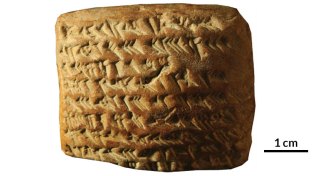 Archaeology
ArchaeologyBabylonians used geometry to track Jupiter’s movements
Babylonians took a geometric leap to track Jupiter’s movements long before European astronomers did.
By Bruce Bower -
 Cosmology
Cosmology‘The Cosmic Web’ weaves tale of universe’s architecture
A new book chronicles the quest over the last century to understand how the universe is pieced together and how it came to be this way.
-
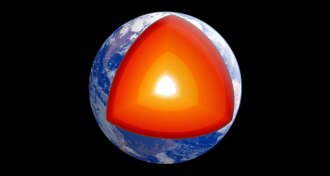 Earth
EarthEarth’s inner secrets divulged in ‘Into the Heart of Our World’
A scientific journey to the center of the Earth includes just as much excitement and mystery as Jules Verne’s classic novel, a new book demonstrates.
-
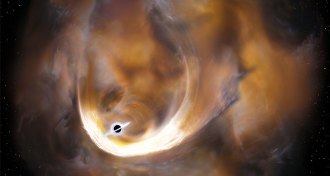 Astronomy
AstronomyMiddleweight black hole suspected near Milky Way’s center
A gas cloud in the center of the galaxy might be temporarily hosting the second most massive black hole known in the Milky Way.
-
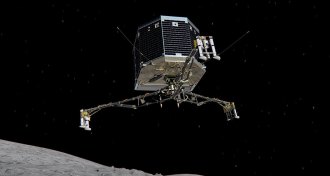 Planetary Science
Planetary ScienceTime running out on comet lander
Philae’s days are numbered as temperatures on comet 67P drop and attempts to communicate with the lander fail.
-
 Planetary Science
Planetary ScienceEvidence mounts for hidden ninth planet
A new analysis of bodies in the Kuiper Belt strengthens the case for an unseen planet lurking in the outer regions of our solar system.
-
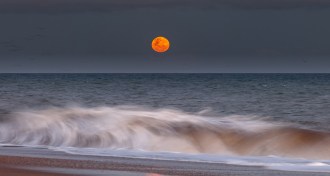 Climate
ClimateAtmospheric tides alter rainfall rate
Atmospheric tides caused by the moon’s gravitational pull ever-so-slightly alter rainfall rates on Earth by producing rises and falls in atmospheric pressure.
-
 Science & Society
Science & SocietyHuman evolution, biomimicry and more go on display
A new human evolution gallery and a lecture series on Europa are among science events to explore in February 2016.
-
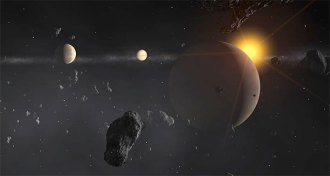 Astronomy
AstronomyThe votes are in: Exoplanets get new names
Arion, Galileo and Poltergeist are just three winners of a contest to name planets and suns in 20 solar systems.
-
 Astronomy
AstronomyExploding star is the brightest supernova ever seen
The brightest known supernova put out more energy than 500 billion suns.
-
 Astronomy
AstronomyAs first run of gravitational wave search winds down, rumors abound
Advanced LIGO has completed its first search for gravitational waves. Researchers are crunching the data as rumors swirl of a detection.
By Andrew Grant -
 Astronomy
AstronomyReaders ponder mysterious origins of oxygen on comets and Earth
Readers pondered the origins of oxygen within a comet and during Earth's history.